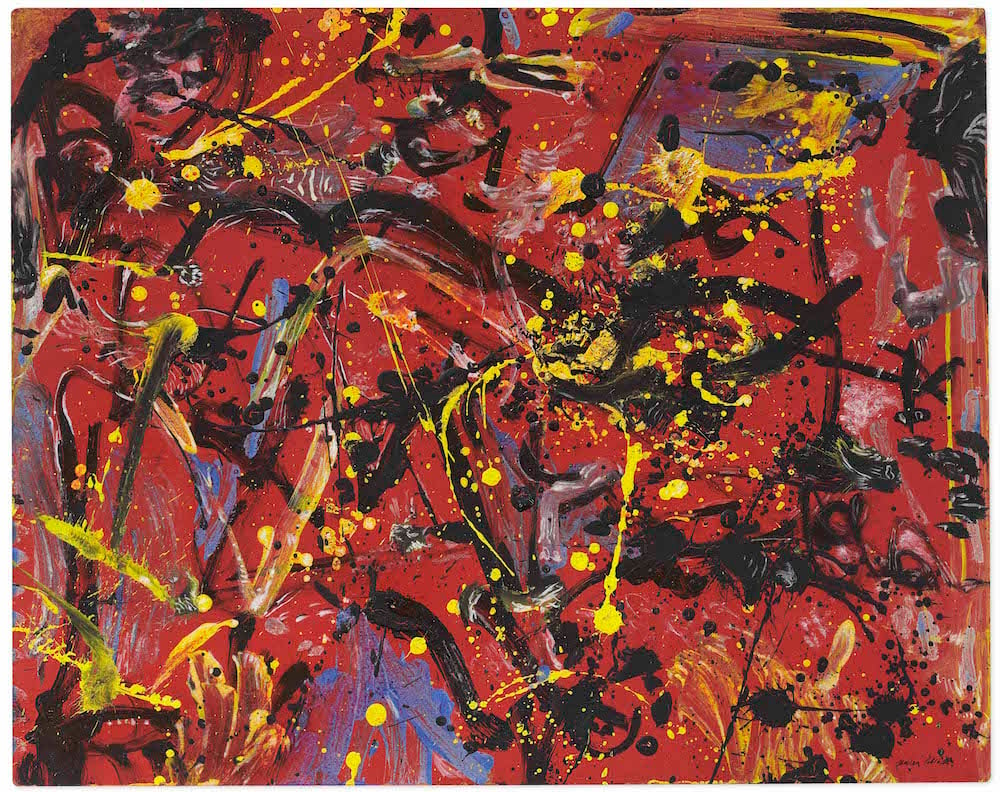
The Everson Museum in Syracuse, New York, has become the latest institution to sell off a major artwork to fund its efforts to diversify its collection. The early Jackson Pollock painting, Red Composition (1946), is expected to fetch between $12 million and $18 million at Christie’s. The proceeds will be used, according to the museum, to fund acquisitions of work by artists of color, women artists, and others under-represented in its holdings.
One of the first paintings demonstrating Pollock’s breakthrough “drip” technique, Red Composition will be a centerpiece of Christie’s new October evening sale. (The house announced last month that it would break from the traditional auction calendar, which sees the major fall New York evening sales held in November.) The painting was the final work Pollock painted in 1946 and came directly after his “Sounds in Grass” series.
It also comes with sterling provenance: it was first owned by legendary dealer and Pollock patron Peggy Guggenheim and was donated to the museum in 1991 by Dorothy and Marshall Reisman. Pollock’s current auction record is $58.4 million, set in 2013 for Number 19 (1948) at Christie’s New York. To date, more than eight Pollock works have sold for over $20 million apiece at auction, according to the Artnet Price Database.
The Everson Museum, which focuses on American art, is the latest institution to resort to deaccessioning in an effort to diversify its collection. Last year, the San Francisco Museum of Modern Art sold a Mark Rothko painting (which, coincidentally, also had a connection to Peggy Guggenheim) for $50 million to create a dedicated acquisition fund, while the Baltimore Museum of Art sold off seven works by white male artists to create a war chest for acquisitions of art by women and artists of color in 2018.
Such moves have historically been greeted with mixed reviews: some have praised institutions for putting their money where their mouth is, while others have questioned why wealthy donors are unable or unwilling to provide the funds for museums to expand their collections without having to sell off rare treasures.
Although Red Composition is the only Pollock painting in the museum’s collection, the Everson said it retains an “important work on paper” by the artist.
“By deaccessioning a single artwork, we can make enormous strides in building a collection that reflects the amazing diversity of our community and ensure that it remains accessible to all for generations to come,” Everson director Elizabeth Dunbar said in a statement.
In 2017, the Everson established a Collecting Priorities Plan and since then has been using limited acquisition funds to add works by underrepresented artists. The Pollock sale will help intensify these efforts “at a critical time in the nation’s history and when the museum is actively working to address inequality within the institution itself and the community it serves,” according to a statement.
Robert Falter, a trustee of the Dorothy and Marshall M. Reisman Foundation, believes the work’s donor would have supported the move. “As a longtime board member and benefactor of the Everson, Marshall would have been extremely happy to see his gift used for the greater good of the museum, its future sustainability, and its impact on the community it serves,” he said in a statement.
Funds from the sale will also be used to improve storage of the museum’s more than 10,000-work collection as well as to conserve a sculpture by Henry Moore, among other objects. The Everson is accredited by the American Alliance of Museum (AAM) but is not a member of the Association of Art Museum Directors (AAMD). The Regents of the State of New York and the ethical rules of the AAM allow for the proceeds of deaccessioning to be used for acquisitions and the direct care of the collection.
This is likely not the last major deaccession of the year. This past spring, the AAMD loosened some regulations amid the ongoing lockdown. Through April 10, 2022, museums that access restricted endowments and use the proceeds of selling items in the museum’s collection to meet operating costs will not be sanctioned.